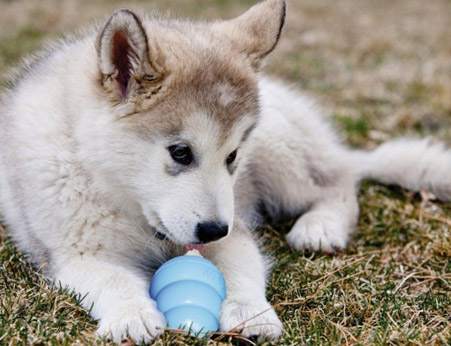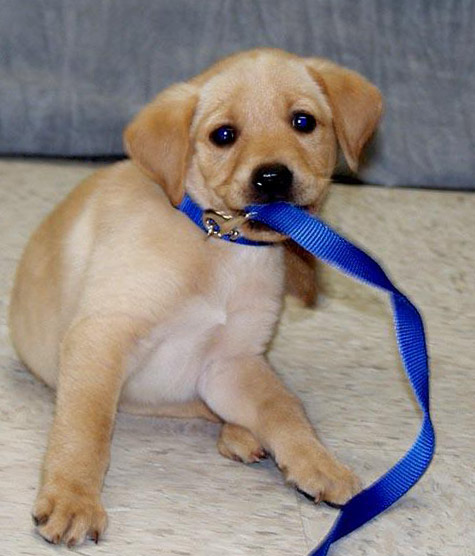How to Stop Puppy Mouthing and Biting
Summary:
One common question from new dog parents is how to stop puppy mouthing, nipping and biting. Puppies, being like a human newborn, explore with their mouth and will engage in play biting along with nipping the pet parent's ankles, arms and hands. The problem is when the sharp puppy teeth break the skin when interacting with everyone that wants to touch the new pup. This form of "play aggression" is often a bit over the top without any inhibition. If the behavior is not corrected when young it can turn into something more dangerous as the dog gets larger.
Teaching methods using games are a great way to reinforce bite inhibition. The use of positive (treats) and negative (stopping game time, moving away) are both ways to eliminate puppy biting and nipping behavior. In general, to prevent puppy mouthing do not encourage a puppy to play with arms and hands and be sure to never hit your pup when training.
Normal Puppy Play Biting and Mouthing
It is normal for puppies to engage in playful nipping and mouthing behaviors. The behavior begins some time between age 2 and 4 weeks, and continues through age 4 and 14 weeks. During this time puppies learn what is appropriate biting etiquette from litter mates. When a litter mate bites too hard, the recipient of the bite yelps, signaling to the biting puppy that it was too hard. Puppies frequently correct each other's behavior during play. For this reason, it is important that puppies aren't removed from the litter too early.
If a puppy is removed too early, then it is up to the dog parent (you) to provide the necessary training. Not every technique is for every puppy so you will have to match temperament to training. Always provide praise once the biting or mouthing has stopped.
Puppies that are Prematurely Separated From Litter mates Do Not Learn How to Avoid Bites that Injure the Skin
Photo Credit: Washington University
How To Train A Puppy That Keeps Biting
There are several tactics that can be used to stop puppy mouthing and biting behaviors. Most are based on Thorndike's law of effect which states that behaviors just prior to a pleasant event are more likely to be repeated; behaviors just prior to unpleasant events are more likely to diminish.
- Timeouts: Teach your puppy that playtime ends when the pup nips too much. When this happens stand, turn and walk away. When the puppy sits calmly, play can start up again. You can put the puppy in her kennel or behind a baby gate in another room. Combine techniques such as saying "yipe." If the biting doesn't stop, then move to a time out. Don't use this method if the puppy already associates the kennel or cage with being negative. Some puppies hate being confined.
- Play Gently: Act like a litter mate when bitten. Let out a high pitched yelp when the pups teeth contact your skin (try and sound like another puppy). Don't yank your hand from the mouth since quick rapid moves can trigger an instinct used with prey. Make your hand go limp and then move it away. If playing with toys such as a ball it is only natural for the puppy to try and use the mouth as she lunges for the toy. Just use the "yelp" approach each time you feel the teeth. Remember, use a negative, the stoppage of the game when the puppy nips you. Once the puppy only gently nips you, the next step is to teach the pup not to bite at all. The way to do this is to loudly yell "yipe" when bitten, then put the toy away. Do not start play again for a few minutes. After the puppy has calmed down, play can resume. This way the puppy learns that biting the toy is ok, but biting a human puppy parent is not. When you stop play use the words "game over." Over time the puppy will not want to hear those words.
Instead of saying "yipe," some puppies will respond better to "ahhh" using a lower vocal pitch. To a puppy a lower sound could be interpreted as a growl, causing them to back off. Provide praise when the puppy backs off and then provide a reward. Yelling "ow" is also effective. Some owners like to use a firm "no" or negative reinforcement such as a shake can. Mixing up the types of reinforcement is a good way to approach the problem. The goal however is to gravitate toward one method which could be "yipe" or "no."
Note that 90% of puppies will stop after a high peached "yelp." If they stop you can continue the game. 10% of the time puppies that are over stimulated or over-tired will not stop, In this case a time out is needed. - Do Not Hold the Mouth Closed When the Puppy Nips: This can be seen as a punishment that may cause the puppy to bite harder next time. This aggressive behavior on your part can cause the pup to not stop puppy mouthing. You can hold the puppy gently and firmly until her body relaxes. Then say "okay" and release.
- Avoid Hand Wrestling: Do not tease a puppy with your hand over the muzzle. The puppy shouldn't be able to jump on your toes as well. Using the toes and hand is teaching the puppy to use the mouth instead of curbing the behavior.
- Limit games: Not all puppy games are created equal. Look for game outlets that focus on behaviors such as fetching and pulling. This includes tug-of-war type games and fetching toys. One tip is to teach the puppy to drop the toy when commanded to do so. This teaches a beginning and end to the game.
- Chew toys can help: Remember that as the teeth grow the puppy's gums can hurt. Chew toys can help to relieve the pain. You should also note the times of day since this can be when the puppy experiences more pain. Freezing a chew toy can help relieve some of the pain.

A Puppy Teething Toy Can Ease Gum Pain While Providing A Positive Place For Puppy Mouthing and Biting Behavior
Shown: Kong Puppy Toy/Amazon
- Encourage licking behavior as a substitute for nipping: Rub some type of appealing food on your hand such as peanut butter or turkey. When the puppy goes to lick it off, say "lick" and praise the pup along with a treat. Now when you puppy goes to nip you say "lick" to redirect the behavior. You can also lick the palm of your hand and then let the pup lick your saliva.
- Leave the room: If the puppy nips, leave the room and say "time out" as soon as you feel the nip. This keeps things simple since you do not have to move the puppy to her time-out spot. You will need to place a gate between you and the puppy for this method to work.
- Puppy school: A local training class can go a long way to teaching the correct behaviors (for both the puppy and the puppy parent.
Prevention of Puppy Biting
You can prevent or stop puppy mouthing and biting by doing these things:
- Obedience training in a class
- Frequent exercise. Note that larger dogs need more than 3 walks per day and may be mouthing out of excessive energy, frustration or just plain boredom.
- Play dates with other puppies
- Keep the puppy occupied with toys such as Kong Toys with food dispensers
Teach Other Puppy Behaviors At The Same Time
Teaching the puppy to sit before common activities reinforces discipline. A puppy should sit on cue before:
- Interacting with visitors
- Playing games
- Before going for a walk and having the leash clipped on
For a Puppy Biting Feet and Ankles
Sitting can also be used when a puppy nips the ankles of feet while you are walking. Teach the puppy to sit when you approach and reward with a treat after you pass by. You can also as an alternative toss a treat to your side as you walk by your puppy. If the puppy comes to your feet after retrieving the treat, send another treat off to the side. Add a voice cue such as "excuse me" or "find it" before tossing the treat. Soon the puppy will hang back away from your legs waiting for a treat to be thrown.
Signs of Puppy Aggression
If you see signs that indicate aggressive behavior such as aggressive posture or growling, consult a trainer or behaviorist. These should be corrected immediately before they become a problem.
Ask Our Vet A Question, We'll Answer It For Free
Have A Dog Behavior Question or Story?
Do you have a question for our veterinarian about Dog behavior? If yes, we will answer it for free.
We will do our best to get back to you quickly (depends on how many questions we receive each day). If you do require an immediate response we suggest using this online dog veterinary service that is available now.
Brochures
Brochures for Additional Information on how to stop puppy mouthing:
For More Information on how to stop puppy mouthing:
Puppy Mouthing and Biting?
Association of Professional Dog Training
Researched by: Jeff Grill


